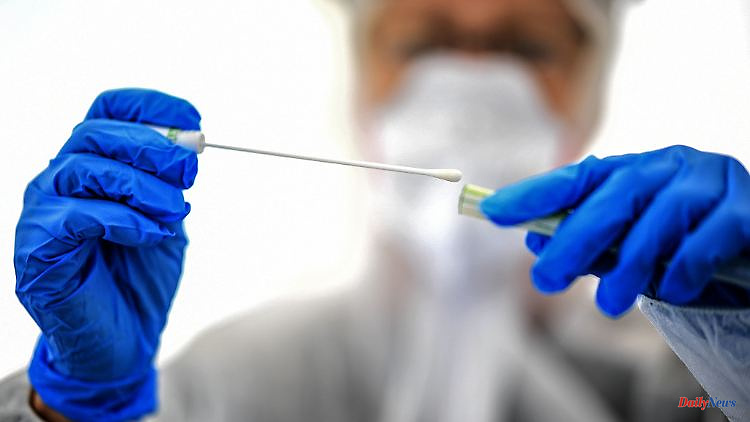After the carnival, the number of corona cases in the fool's strongholds increases sharply. That was expectable. However, it is also clear that many cases are not even included in the statistics.
Three years ago, after the carnival, North Rhine-Westphalia recorded the first major wave of infection with the novel coronavirus Sars-CoV-2. Some of the infection clusters were directly related to the celebrations at the time. Even three years later, the Fools' Time still acts as a catalyst for contagion, as the numbers show.
In Cologne in particular, the number of cases rose sharply after the carnival week - more than in the two previous years, as the city of Cologne confirmed to ntv.de. "There were no restrictions or requirements due to the pandemic this carnival season," the statement said. The omission of the mask requirement in local public transport is also mentioned as a possible cause.
Nevertheless, Cologne stands out in a state and nationwide comparison: the seven-day incidence throughout North Rhine-Westphalia was 205 cases per 100,000 inhabitants. In Cologne, on the other hand, it jumped to a good 412 after a typical, reporting-related "weekend kink". Aachen, Düsseldorf and Mainz also recorded increases in the number of cases after carnival or carnival (ntv.de had already carried out an initial evaluation in this article).
However, only laboratory-confirmed infections are included in the statistics of the Robert Koch Institute. Since the required PCR tests are only rarely carried out, it must be assumed that there is a significant underreporting. In this respect, the reporting statistics only show a trend - limited to the period in which a specific, uniform procedure for PCR tests applied. How many people are actually suffering from Corona cannot be derived from this.
The Cologne health department also assumes that the number of corona cases is significantly underreported, "because most of the people of Cologne now leave it at a positive rapid test and do not carry out a PCR test for confirmation," the city told ntv.de. The possibility of free PCR re-testing has "always" existed so far. This only ceases to apply on March 1st with the end of the Corona Protection Ordinance. However, it could be that medical practices continue to take swabs free of charge, according to Cologne's press office.
The demand for laboratory tests still seems high: the number of PCR tests carried out on Monday alone was 1117. The Cologne health department concedes that this is actually more than usual. The number of tests doubled within four weeks. Almost every second test is now positive.
In addition, 6,926 rapid antigen tests were reported from private test centers, pharmacies and medical practices, of which 9.23 percent were positive. However, the press office points out that many quick tests can be carried out at home and cannot be recorded by the statistics.
The testing and reporting system can still only show a fraction of the infection process. Instead, hospital data and wastewater analyzes should be consulted to assess the situation. This was also pointed out by North Rhine-Westphalia's Health Minister Karl-Josef Laumann in a press conference on Tuesday. According to this, 4125 patients are currently being treated in hospitals nationwide due to corona disease. Most of them are on a normal station. Only 109 patients need to be ventilated.
He would have wished for such numbers three years ago, said Naumann in his review of the dramatic beginning of the pandemic. According to the Ministry of Health in Düsseldorf, more than 31,000 people have died in connection with a corona infection in North Rhine-Westphalia alone since 2020.
At this year's carnival, this no longer played a role. For the first time since 2020, the strongholds celebrated again without restrictions. Everyone should have been aware of the risks: Even before the holidays, the daily reported number of infections in North Rhine-Westphalia had increased, albeit moderately.
It is striking that the number of corona patients in hospitals has increased significantly over the same period. At the end of January, fewer than 2,000 people with severe corona disease were in the hospital. So there was a doubling in just a few weeks, which was not immediately apparent in the case statistics. However, because the severity and duration of the disease with Corona vary greatly, such developments are difficult to predict. The incomplete case recording is only one factor among many that make an assessment difficult.
The wastewater studies that have been carried out in pilot projects so far also have their weaknesses and have so far been of little help in assessing the effects of the unrestricted carnival celebrations on the current corona development. Data analysis is complex and takes time. The latest edition of the country's weekly wastewater monitoring is dated February 24th and only relates to the period up to February 15th. Even then, before the start of the carnival week, there was already a slight increase in the viral load.
Future reports are likely to confirm the rising trend in reporting statistics. If the increase in viral load in the corresponding period is significantly higher than in the RKI figures, that would be a further indication of the extent of the underreporting. However, this cannot be quantified.
Even if one assumes that the current infection process is more dynamic than can be seen in the official statistics - and even if this assumption could be proven - it remains an inconsequential finding. Because apart from the individual protective measures of the individual, there are hardly any health policy interventions outside of medical facilities that could break the chain of infection. From March 1st, the Corona Protection Ordinance of the State of North Rhine-Westphalia will finally be history. However, the virus remains and will continue to trigger waves of infection - albeit less serious, one hopes.












